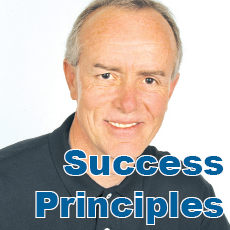“Confidence is that feeling by which the mind embarks in great and honorable courses with a sure hope and trust in itself,” according to Roman philosopher Marcus Tullius Cicero.

William “Bud” Hart, of Haverhill, shares “Success Principles”—ideas for living a greater, better and more accomplished life, and building habits that stick. He also coaches clients to incorporate strategies for boosting their mental and physical performance during everyday living.
Recently I worked with a client who was a bit apprehensive about his confidence as he started a new job. He wanted to spend time to boast his confidence about his confidence. This may seem like an odd request, but not when you really think about it. This client is not alone. A lot of people have questions about confidence. They want to know what it actually is, where it comes from and how to get and have more of it.
Confidence is a human tendency. The Merriam-Webster Dictionary definition of a tendency is a quality that makes something likely to happen or that makes someone likely to think or behave in a particular way. These days, bookstore shelves are packed with volumes dedicated to improving personal confidence and “self” tendencies (self-esteem, self-efficacy, self-assurance). So many in fact you know that insecurity is one of the great problems besetting just about all of us. And its potential cure is a sizeable money making industry.
The truth is without a modest, but sound confidence in our own abilities and powers we cannot be successful or happy. Just as a car needs to be maintained properly so it can be relied upon not to breakdown when needed, our personal confidence (self-image as psychologists often refer to it) must be maintained if we expect it to support and sustain our efforts when we want to perform at our best.
It’s a natural human tendency and very easy to build up feelings of either security or insecurity by how we think. If in our thoughts, we fix our attention on lack and threatening expectations the resultant feeling can’t be anything but insecure (as my client was experiencing). What is even more serious is when self-doubting thoughts are allowed to become our regular tendency they unavoidably create the very conditions and results we don’t want.
The question I posed to my client is this, reflecting on the many past life successes already programmed in your mind what do you trust yourself to do in your new position? More than 2,000 years ago the Roman philosopher Marcus Tullius Cicero said, “Confidence is that feeling by which the mind embarks in great and honorable courses with a sure hope and trust in itself.”
It’s not a newfangled idea. Nothing has changed in the more than 2,000 years since Cicero uttered these words. A confident mind can serve us better than even ability and knowledge can. And only through ignorance or neglect does one’s personal confidence wane. Hopefully my client gets this and continues to take care to think success as he takes on his new job and every new course with a sure hope and trust in himself.
William “Bud” Hart is a certified “Mindset” Coach, Accountability Partner and Business Consultant. Founder of Hart Group, www.hartgroupma.com.

